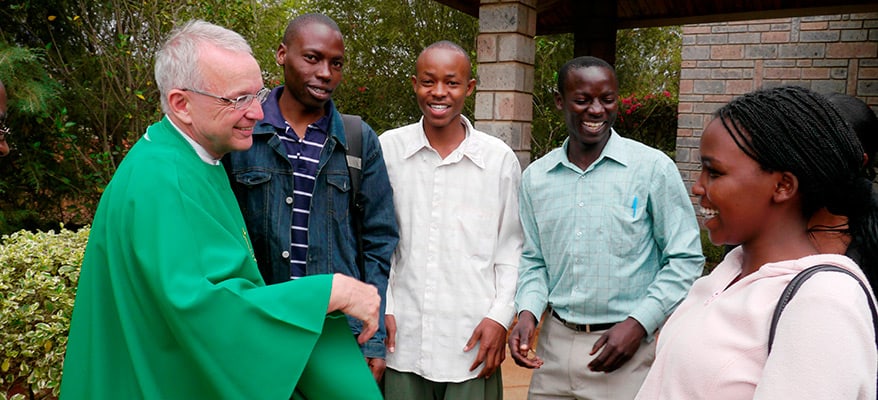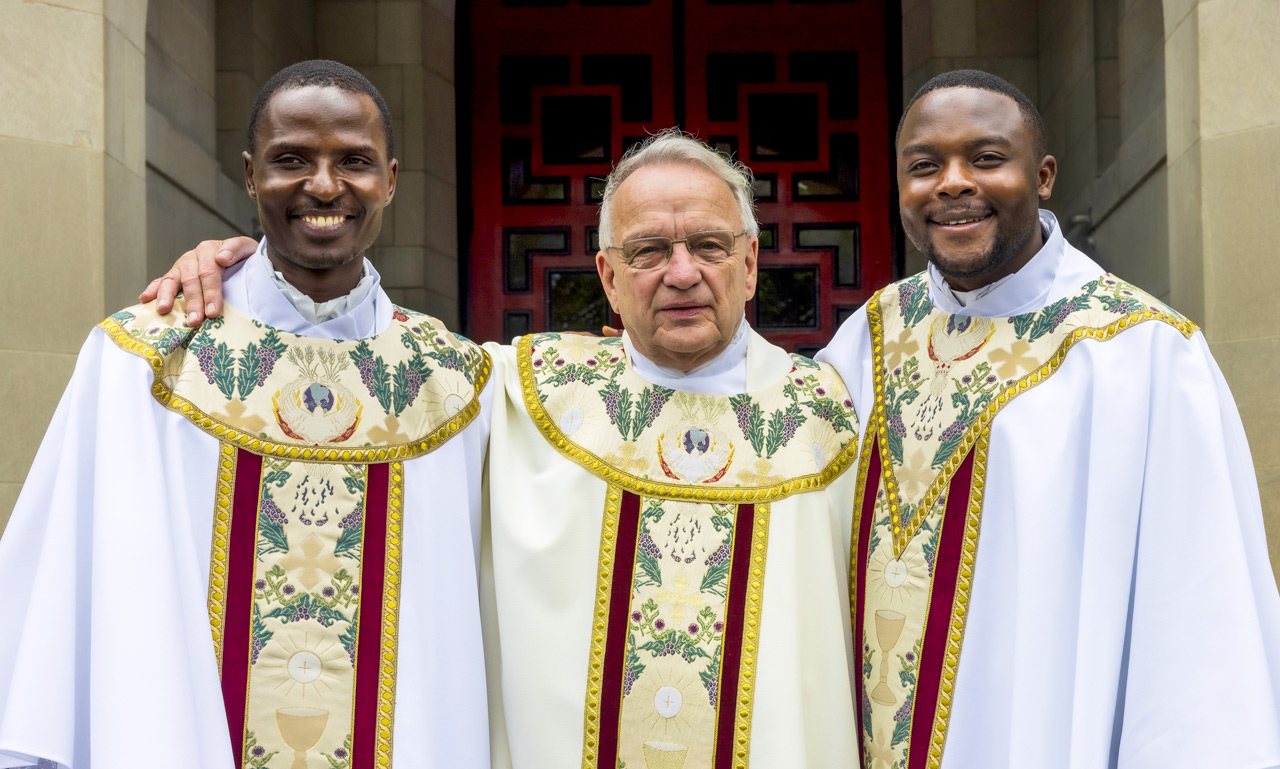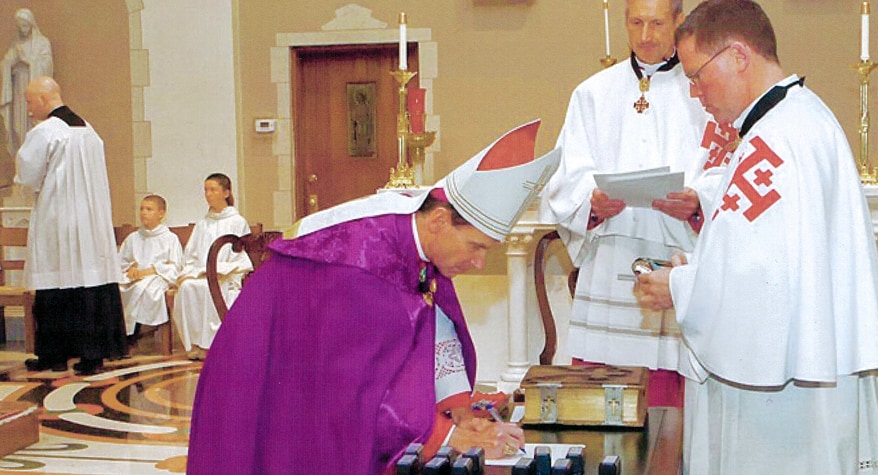
by Maryknoll Society | Apr 3, 2012 | Notable Maryknollers
Lumina News – Wednesday, March 14, 2012
(Supplied photo courtesy of Rich Cox / Catholic Diocese of Raleigh)
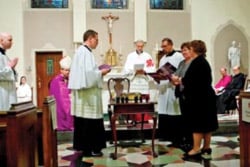 Bishop Michael Burbidge, from left; Father James F. Garneau, Episcopal Delegate for the Cause; Msgr. Jerry M. Sherba, Chancellor of the Diocese who administered the oaths; Father Ja Van Saxon, Promoter of Justice; Angela Godwin Page, Actual Notary and Maureen Foster, Adjunct Notary, gather on Friday, March 9, in Raleigh for a prayer service and to take an oath, beginning the diocesan phase of the Cause for Beatification and Canonization of Father Thomas Frederick Price.
Bishop Michael Burbidge, from left; Father James F. Garneau, Episcopal Delegate for the Cause; Msgr. Jerry M. Sherba, Chancellor of the Diocese who administered the oaths; Father Ja Van Saxon, Promoter of Justice; Angela Godwin Page, Actual Notary and Maureen Foster, Adjunct Notary, gather on Friday, March 9, in Raleigh for a prayer service and to take an oath, beginning the diocesan phase of the Cause for Beatification and Canonization of Father Thomas Frederick Price.
The Catholic Diocese of Raleigh has officially opened the diocesan phase of the Cause for Beatification and Canonization of North Carolina’s first native Catholic priest.
Tribunal members met Friday, March 9, in Raleigh for a prayer service and to take an oath as they begin a formal study of Father Thomas Frederick Price, who was born in Wilmington in 1860.
The tribunal’s historical and theological commissions will study Father Price’s writings and records about his life and listen objectively to witnesses who may have knowledge of his work or reputation, Father James F. Garneau, pastor of St. Mary of the Angels Catholic Church in Mount Olive, said Monday, March 12.
Garneau, Episcopal delegate for the cause, added they have a list of about 30 witnesses from throughout the country so far.
“We don’t have living witnesses from his time, eyewitnesses,” Garneau said. “But we have people in the next generation, people who knew people who knew Father Price.”
Bishop Michael Burbidge opened the cause at Sacred Heart Cathedral. Among those attending was Edward Price of Clayton, one of Father Price’s descendants.
“He was a fascinating man,” Edward Price said Monday, March 12, by telephone.
“Imagine having a conversation with someone and saying, ‘By the way, my fourth cousin is a saint.’ I find that remarkable,” he added when asked about his ancestor possibly being declared a saint someday. “How many people on this earth can say that?”
Price established the Nazareth Community orphanage in Raleigh, co-founded the Maryknoll Fathers and Brothers mission society in New York with Father James A. Walsh and served on Maryknoll’s first foreign mission in 1918. He suffered an infected appendix while in China and died in 1919.
A family connection was made when Edward Price saw an issue of NC Catholics magazine last year with Father Price on the cover. He recalled his father telling him about a famous priest from North Carolina they might be related to.
“I mailed the copy to my father and that pretty much got the ball rolling,” Edward Price said.
Family genealogical research helped confirm that connection, and the family contacted the bishop and visited Maryknoll, said Edward Price’s father, Carl Price of Red Bank, N.J.
Carl Price, who grew up in Brooklyn, N.Y., said his father had mentioned having had a cousin from North Carolina who co-founded the Maryknoll Society.
“We kind of knew this as a fact of family history but…we never took any action upon it,” Carl Price, 82, said during a telephone interview Thursday, March 8.
The Price family came to the United States from Wales and settled in Wilmington, where some family members were buried at Oakdale Cemetery, he said.
Father Price’s father — Alfred Lanier Price, editor of the Wilmington Daily Journal — had a brother, William, who was Carl Price’s great-grandfather. Father Price was editor for a magazine about the Catholic faith called Truth.
“It’s just such a wonderful, wonderful thing,” Carl Price said. “The more I’ve learned through the genealogy that there is a blood connection here, it’s something I never expected. And I’m sure my father, if he were alive, he would be astounded about this too.”
“It’s such an honor,” he added. “I’m overwhelmed and I feel very blessed by this connection.”
The tribunal will examine if Father Price’s life demonstrated heroic virtue and will study reports of any miracles people believe are from his intercession or prayers.
“We’re not looking to jump to conclusions,” Garneau said. “The church is deliberate on this so if a declaration is made there’s a certain assuredness we can point to, even among nonbelievers.”
Father Price, called the “Tar Heel Apostle,” is credited with spreading Catholicism throughout North Carolina. He belonged to St. Thomas Church in downtown Wilmington, which is now St. Thomas Preservation Hall.
“I hope this beautiful area of our diocese in Wilmington takes great pride, because Father Price, this was where he was born and certainly grew in his own faith,” Burbidge said during a visit to Wilmington on Wednesday, March 7.
Father Price’s legacy includes 39 acres of land near Raleigh remaining from about 400 acres he bought in 1897, which is where the diocese planned to build a new cathedral. The current cathedral seats approximately 320 people and is the nation’s second smallest Catholic cathedral after the one in Juneau, Alaska, the bishop said.
In death Father Price is near two important figures of his life — his body is buried near Walsh’s remains at Maryknoll, while his heart is buried near St. Bernadette’s tomb in France.
When asked why the church recognizes saints, Burbidge said it is a way to provide concrete examples and is similar to honoring respected members of professions.
“We can talk about saintly virtues,” Burbidge said. “But it’s a lot better when you can say, ‘And here is an example, and here are some of the things that this woman or this man did in his or her earthly life. These are obstacles that they faced, and this is how through their holiness that they conquered it.’”
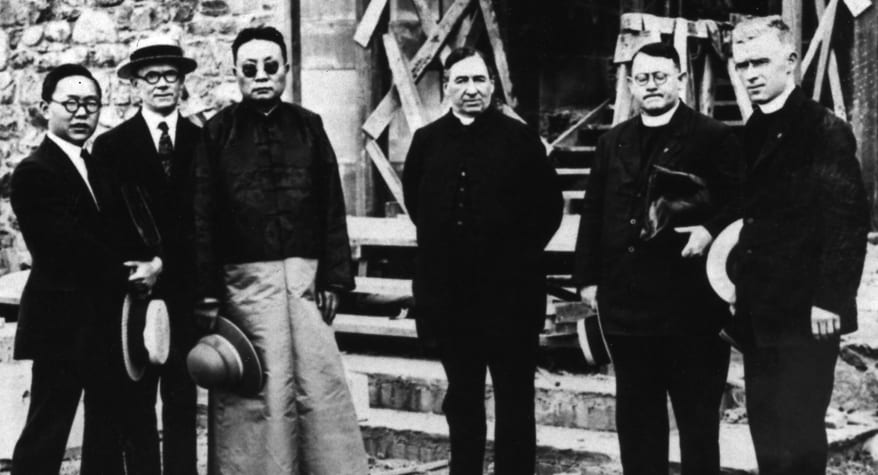
by Maryknoll Society | Nov 16, 2011 | Call to Mission, Events & Celebrations, Notable Maryknollers
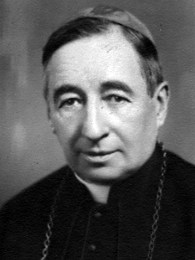 The year commemorating the centennial of the Maryknoll Fathers and Brothers has again been blessed. The Maryknoll Society is rejoicing for the cause for beatification and canonization of Maryknoll Society co-founder Bishop James A. Walsh.
The year commemorating the centennial of the Maryknoll Fathers and Brothers has again been blessed. The Maryknoll Society is rejoicing for the cause for beatification and canonization of Maryknoll Society co-founder Bishop James A. Walsh.
On Wednesday, November 9, 2011 at the Archdiocese of New York in New York City, the cause for beatification and canonization of Bishop Walsh was formally opened by the diocesan tribunal led by Monsignor Douglas Mathers. Receiving official approval from the Vatican to begin, the procedure now is formally in place to pursue the cause for beatification of Bishop Walsh in the Archdiocese of New York.
Attendees at the ceremony included Father Edward M. Dougherty, superior general of the Maryknoll Society who has served the mission of the Church in Africa. All official witnesses took their oaths on the Bible to discharge their respective obligations with integrity and honesty.
The next steps in the process include:
• Obtaining formal witness testimony.
Since few people today actually met Bishop Walsh, who died during 1936, his cause is considered, technically, an “historical” cause. Most evidence will be textual. Witnesses to be called will be faithful Catholics willing to testify as to their belief in Bishop Walsh’s reputation for sanctity and heroic virtue.
A second class of witnesses will be divided into groups of historians and theologians. Historians are charged with gathering and guaranteeing the authenticity of any documentation on the life, works and faith of Bishop Walsh that includes all published and unpublished writings. They will submit reports about his writings along with a biographical sketch. The theologians will examine the papers and then issue reports verifying the integrity of the candidate and absence of any defect of faith and morals.
• Documentation delivered to Rome.
Once the cause is complete at the diocesan level, all documentation will be delivered to Rome for the second phase of the process. Reports and documentation again will be examined. Further documentation, including any possible testimony of miraculous intervention, will be gathered.
• Prayers and inquiries of others.
During the process, anyone interested in the cause of Bishop Walsh is welcome to inquire about him at Maryknoll, offer pertinent faith experience and offer prayers of support of the cause, and, especially, of the mission of the Church to which Bishop Walsh dedicated his life.
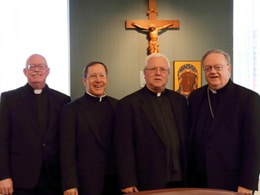
Monsignor Douglas Mathers, second from left, vice chancellor of the archdiocese and episcopal delegate for the cause, joins Auxiliary Bishop Dennis Sullivan, the archdiocese’s vicar general, right; Father Edward M. Dougherty, M.M, superior general of the Maryknoll Fathers and Brothers, second from right; and Father Michael P. Walsh, M.M., member of the historical commission, left, at the swearing-in ceremony for the opening of the sainthood cause of Maryknoll co-founder Bishop James A. Walsh at the Catholic Center in Manhattan on November 9. Photo courtesy of Catholic New York.
Beatification and Canonization Witnesses
• Postulator: Dr. Andrea Ambrosi
• Episcopal Delegate: Reverend Msgr. Douglas J. Mathers
• Promoter of Justice: Reverend Richard Welch C.Ss.R.
• Actual Notary: Maryknoll employee Marie Ray
• Adjunct Notary: Maryknoll employee Maureen Foster
• Copyist: Maryknoll employee Holly E. Brown
• Members of the Historical Commission (3): Reverend Michael P. Walsh, M.M. (who has served the mission of the Church in South China), Alan B. Delozier and Paul F. Gibbons
• Members of the Theological Commission (2): Patrick Hayes and Reverend Mark Francis O’Malley
About Bishop James A. Walsh
James Walsh was born to middle-class parents (James Walsh and Hanna Shea) in Cambridge, Massachusetts, on February 24, 1867. After attending public elementary school, he graduated from Boston College High School with skills in debating and journalism. He attended Boston College but later transferred to Harvard College to study bookkeeping. Studies were completed at St. John’s Seminary in nearby Brighton.
At the seminary, Father Walsh was inspired by a rector, a Sulpician (a society of secular priests founded during 15th century France) whose classmate in Paris, Theophane Venard, had died as a famous martyr in Indochina. A decade after his 1892 ordination at the Cathedral of the Holy Cross, Father Walsh retraced Venard’s steps in France along with those of other French martyrs, and he became convinced that the blood of martyrs is the seed of the church.
Father Walsh served as curate at St. Patrick’s Church in Roxbury until he was appointed diocesan director of the Society for the Propagation of the Faith during 1903. Among his responsibilities was to raise money to support overseas mission, and during this time, he began to develop his vision, a modernized version of mission, for a mature U.S. Church that was eager to fulfill exciting and joyful missionary responsibilities around the world.
Along with the Catholic Foreign Mission Bureau, Father Walsh founded The Field Afar magazine, a monthly publication about the foreign missions of the Catholic Church. Years later, this magazine would become the Maryknoll magazine that continues to be published today (along with its bilingual counterpart Revista Maryknoll) by the Maryknoll Fathers and Brothers.
During 1910, at the 21st Eucharistic Conference in Montreal, Father Walsh shared his vision of U.S. Catholic mission with Father Thomas Frederick Price of North Carolina. Realizing they shared a common call to mission, the urbane Father Walsh and the more rural Father Price collaborated on plans for a mission society within the U.S. Catholic Church. Soon after, the bishops of the United States formally sanctioned the pursuit of their vision to recruit, send and support U.S. missioners around the world.
With this approval, Father Walsh and Father Price traveled to Rome to present their vision of mission. They received the blessing of Pope Pius X on June 29, 1911 (the feast of Saints Peter and Paul), which is the founding day of the Catholic Foreign Mission Society of America that, over the years, has become more well-known as Maryknoll Fathers and Brothers.
Father Walsh was a model priest and a natural leader. He was the first Superior General of the Society, the treasurer, the editor of its publication, rector of the seminary, spiritual director of the Maryknoll Sisters that was formed during 1912, along with master organizer, fundraiser, publicist and overseer of plans and building for the Society. It is difficult to find any aspect of the foundation of Maryknoll that did not benefit from the direction and oversight of Father Walsh.
Father Walsh’s contributions to the Catholic Church in the U.S. and to the growth of mission were celebrated when he was ordained as bishop on June 29, 1933 by Pope Pius XI in Rome. Only a few years later, on April 14, 1936, Bishop Walsh passed away.
Causes for Father Price and Father Capodonno
The cause for beatification and canonization of Bishop Walsh is the third for the Maryknoll Society.
Causes have been established for Maryknoll co-founder Father Thomas F. Price (pending) and for Maryknoll Father Vincent R. Capodanno.
Thomas Price was born in Wilmington, North Carolina, the eighth child of Alfred and Clarissa Bond Price, on August 19, 1860. Having converted to the Catholic faith, his parents raised their children to be devout Catholics in the midst of Southern apathy toward the religion.
During his formative years, Thomas Price was deeply influenced by priests from his Wilmington parish of St. Thomas. With a religious upbringing that included profound understanding of the deep devotion his mother held for the Blessed Virgin Mary, the young Price soon became attracted to the priesthood. Father Price became the first Catholic priest born in North Carolina.
Vincent R. Capodanno was born on February 13, 1929 in Staten Island, New York. During the 1960s, he asked to be reassigned from his Maryknoll mission in Formosa to serve as a U.S. Navy chaplain. He served with a unit of the U.S. Marines in Vietnam and, though mortally wounded during an ambush on September 4, 1967, he continued to administer to others who were injured.
Father Capodanno is the only chaplain to receive the Medal of Honor for service with the Marine Corps. During 2011 in Triangle, Virginia, the Marine Corps Heritage Foundation dedicated the “Sacrifice Window” to Father Capodanno in the Semper Fidelis Memorial Chapel at the National Museum of the Marine Corps.
Watch a video about Bishop Walsh click here.
Watch this same video on Youtube by clicking here.

 Bishop Michael Burbidge, from left; Father James F. Garneau, Episcopal Delegate for the Cause; Msgr. Jerry M. Sherba, Chancellor of the Diocese who administered the oaths; Father Ja Van Saxon, Promoter of Justice; Angela Godwin Page, Actual Notary and Maureen Foster, Adjunct Notary, gather on Friday, March 9, in Raleigh for a prayer service and to take an oath, beginning the diocesan phase of the Cause for Beatification and Canonization of Father Thomas Frederick Price.
Bishop Michael Burbidge, from left; Father James F. Garneau, Episcopal Delegate for the Cause; Msgr. Jerry M. Sherba, Chancellor of the Diocese who administered the oaths; Father Ja Van Saxon, Promoter of Justice; Angela Godwin Page, Actual Notary and Maureen Foster, Adjunct Notary, gather on Friday, March 9, in Raleigh for a prayer service and to take an oath, beginning the diocesan phase of the Cause for Beatification and Canonization of Father Thomas Frederick Price.
 The year commemorating the centennial of the Maryknoll Fathers and Brothers has again been blessed. The Maryknoll Society is rejoicing for the cause for beatification and canonization of Maryknoll Society co-founder Bishop James A. Walsh.
The year commemorating the centennial of the Maryknoll Fathers and Brothers has again been blessed. The Maryknoll Society is rejoicing for the cause for beatification and canonization of Maryknoll Society co-founder Bishop James A. Walsh.


